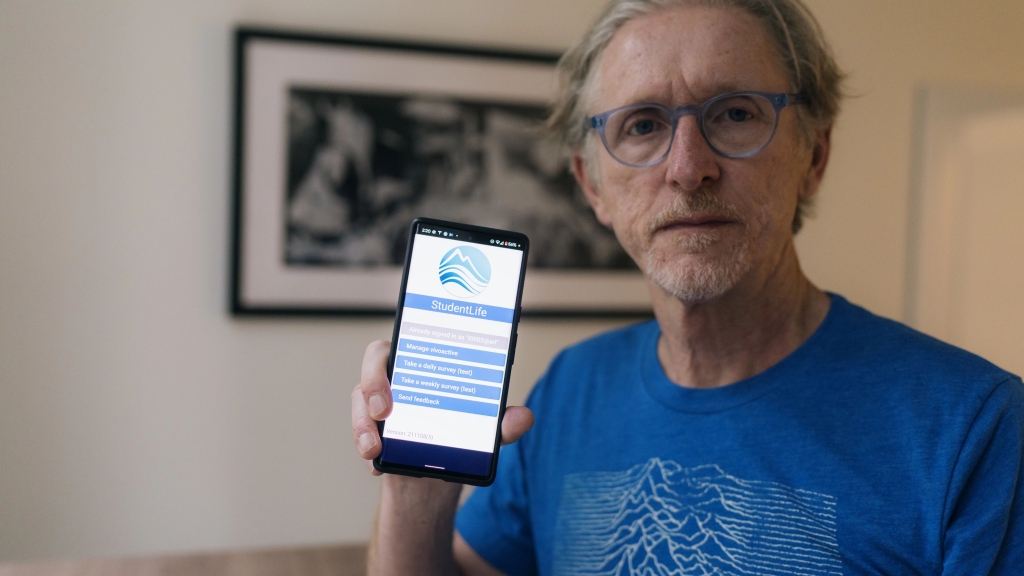A study led by Dartmouth's Albert Bradley 1915 Third Century Professor of Computer Science Andrew Campbell, which tracked student mental health at Dartmouth using smartphones, won the 2024 UbiComp 10-Year Impact Award.
The award, which recognizes the decade-long impact of the 2014 paper "StudentLife: assessing mental health, academic performance and behavioral trends of college students using smartphones," was announced at UbiComp/ISWC 2024, the top conference on mobile computing held this week in Melbourne, Australia.
Study co-authors, who share the award, include Rui Wang, Guarini '18, Fanglin Chen, Guarini '15, Zhenyu Chen, Guarini '15, Tianxing Li, Guarini '20, former Dartmouth faculty members Dror Ben-Zeev and Xia Zhou, as well as Gabriella Harari, then a graduate student at University of Texas at Austin, and Stefanie Tignor, formerly a professor at Northeastern University.
The researchers built a first-of-its-kind app called StudentLife that automatically monitored sleep duration, physical activity, location on campus, social interactions, and stress levels of 48 Dartmouth students who signed up for the study, using sensors on their Android phones.
The smartphone data, collected over a 10-week academic term, was assessed using machine learning algorithms and other computational methods to infer students' mental states and compare them with academic performance and behavioral trends over the course of the term.
The study found that student mental health patterns and stress levels revealed by the data correlated strongly with academic performance, social interactions, and behavior. When the workload mounted, sleep, gym usage, and time spent talking to friends went down.
Campbell, who was also monitoring himself, noticed that his sleep, stress, and mood levels were worse than the students he was teaching. "That said a lot about faculty life," he quips.
It was clear that phones were a valuable tool to provide continuous mental health assessment and could potentially be used to design crucial interventions.
"As a teacher, I often wondered what was happening behind my students' stressed faces and how we could help," Campbell said when he received the citation at the conference, dedicating the award to his brother Ed Campbell whose struggle with mental health illness inspires his research.
"The StudentLife study was timely because it began in the early years of the emerging mental health crisis among young adults, particularly on college campuses," Campbell said. "It's during these college years that young adults are most likely to experience their first mental health episode."
In their citation, the UbiComp 2024 conference awards committee said, "This groundbreaking paper has had an exceptional influence and significant impact on the field. It pioneered the integration of mental health research with mobile data mining, addressing real-world challenges in innovative ways. The availability of the dataset to the community also exemplifies exemplary research practices."
Indeed, since the paper's initial publication, hundreds of mental health studies have used smartphones and wearables. Campbell and his colleagues recently completed a study tracking 200 students over their four years of college, including through the pandemic.
The new study–which is the longest mobile-sensing study ever conducted–captured the most detailed data yet on how students' self-esteem and mental health shifts during their college years.
By identifying key student populations and stressors, the study revealed potential ways for universities to frame proactive and targeted mental-health policies to improve student well-being. It also provided among the first real-time accounts of how the coronavirus pandemic affected students' behavior and mental health.
"The pioneering work on student mental health using mobile sensing by Andrew and his co-authors has inspired researchers around the world to explore the effects of mental health on college campuses and elsewhere using smartphones," says Devin Balckom, professor and chair of the computer science department. "Their seminal paper is a fitting choice for the 10-year UbiComp award that recognizes research with a sustained and significant impact."
